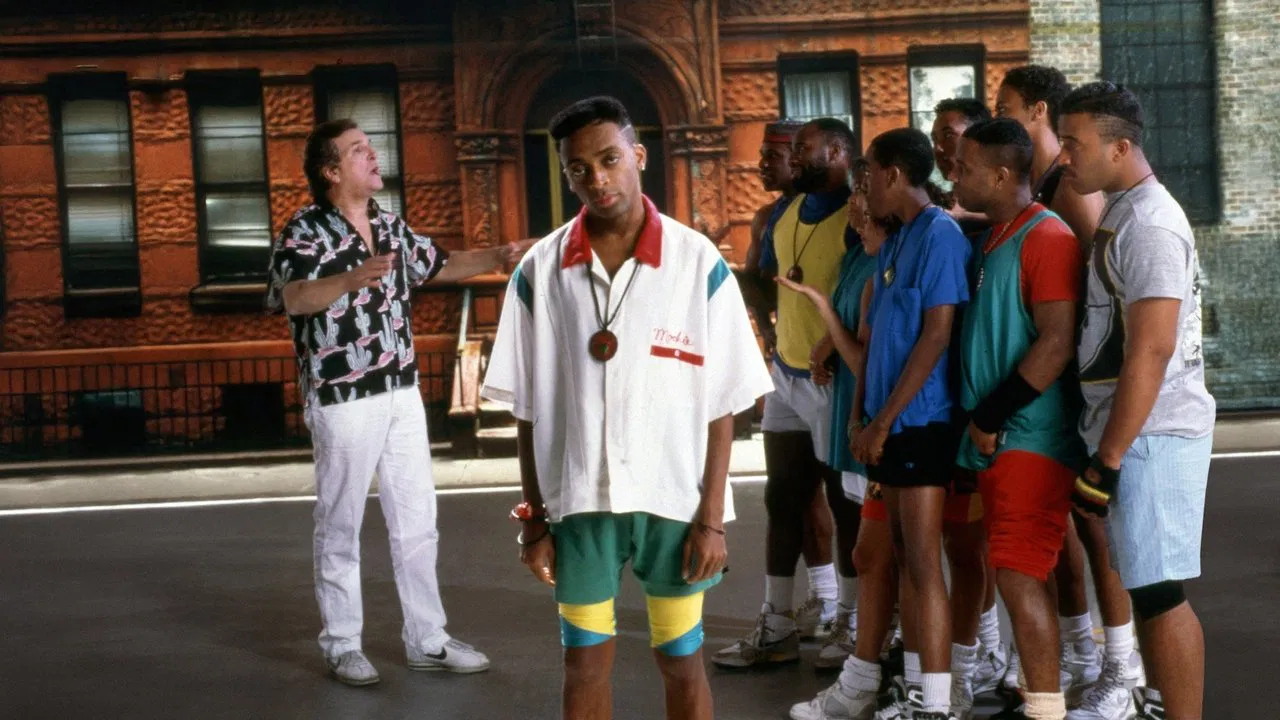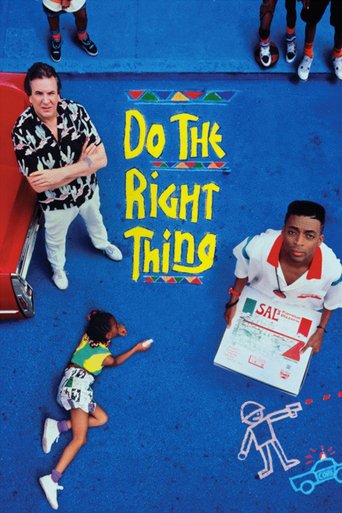

Very very predictable, including the post credit scene !!!
... View MoreI am only giving this movie a 1 for the great cast, though I can't imagine what any of them were thinking. This movie was horrible
... View MoreI enjoyed watching this film and would recommend other to give it a try , (as I am) but this movie, although enjoyable to watch due to the better than average acting fails to add anything new to its storyline that is all too familiar to these types of movies.
... View MoreOne of the film's great tricks is that, for a time, you think it will go down a rabbit hole of unrealistic glorification.
... View MoreDo the Right Thing by Spike Lee is a movie set in the neighborhood of Bed-stuy. This is about a conflict between a set of customers and the pizza shop where the main character Mookie works at. At Sal's famous Pizza there is a wall of fame where there are a bunch of famous white and Italian people the customer ,buggin out, sees this and doesn't think it's right and demands there be some black people on the wall. This is the main conflict but there are other small conflicts throughout the movie. This movie has a lot to learn from in diverse spaces and cooperation between different types of individuals.
... View MoreI just watched Do The Right Thing about 30 minutes ago, and for the majority of the movie, I was just waiting to see the lesson that would be learned, or the right thing that would be done. I feel as if this film gives black people a negative portrayal overall. Mookie is irresponsible and non-dependable, Buggin Out and Radio Raheem are disrespectful to Sal's business, the group of people that Martin Lawrence's character was with, were ignorant and disrespectful as well. And overall it seems as if the black community in this film weren't welcoming to non-black people. I feel as if Sal deserved much better. The end really upset me because I feel as if the riot was aimed at the wrong character. It was not Sal or anything that Sal did that led to Radio Raheem's death, yet a riot broke out that left his business ruined. This leads to the stereotype that black people are violent and ignorant and don't know what they're fighting for. I felt as if no one did the right thing, and there was no lesson to be learned really, and I just don't get it. I don't understand why racial tension grew because Sal didn't want loud music playing in his store, and because he didn't want to put up pictures of African Americans. I don't get what Spike Lee was trying to say with this film. I do like how it explored police brutality and the relationship between the black community and the police, although I wish that would've been touched on a little bit more in detail.
... View MoreDo the Right Thing is Spike Lee's breakout classic film set in Brooklyn. Over his career many of his films are hit and miss, but this is by far his best. Set in Brooklyn on "the hottest day of the year", it has an all-star cast including the director himself, John Turturro, Danny Aiello, Ossie Davis, Ruby Dee, Rosie Perez, John Savage, and many others. The film takes place in the universe of a Brooklyn neighborhood where the theme of race is played out with some great satire as well as depth. It definitely captured the moment of 1980s New York. Radio Raheem (Bill Nunn who passed away recently), was a great segue between scenes as he carries his 20 battery boom box through town. Fight the Power by Public Enemy was the apropos theme song (don't believe the hype; Elvis, contrary to the lyrics was NOT racist). But there is also some well orchestrated film background music to fill out the soundscape, as well as Samuel L. Jackson as Love Daddy, the local DJ. It's great how everyone in the neighborhood seems to know each other and it all comes together with the segue characters connecting Mookie (Lee) with his pizza delivery scenes. Ossie Davis plays the "Mayor" and is the town drunk, but also the wise elder who ominously and understatedly tells Mookie to "always do the right thing" (reminds one of how George Kennedy whispers "cool hand Luke" in that great film). Radio Raheem has a classic "love and hate" scene which revamps the Robert Mitchum Night of the Hunter concept (in this case he has gold knuckles). John Savage has a cameo (I thought it was Tim Robbins at first) who is the European American being unwelcomed into the neighborhood, even though he was born there. The opening has Rosie Perez who plays Mookie's girlfriend dancing to the theme song. The film centers around Sal's Famous Pizzeria owned by Sal (Aiello) and his sons' the racist Pino (Turturro) and Vito (Richard Edson from Stranger than Paradise). Another segue character is the stutterer who goes through town selling the photo of Malcolm X and MLK together (Spike would later go on to direct the great biopic Malcolm X with Denzel Washington). The racial tension builds throughout the day until it culminates in a confrontation with Radio Raheem and Sal. It ends up in a riot with the inevitable overreacting police (the more things change the more they stay the same). Spike Lee created a classic work of art here, but didn't rise to the challenge of becoming an "auteur", since none of his other films comes close to this (possible exception of "Malcolm X", but that was a much different genre).I saw this in the theater in 1989 and it only grows on you with more viewings.
... View MoreMy initial response to this film was somewhat mixed as I was perplexed with Spike Lee's intentions in the film. I was somewhat confused as to whether Spike Lee was trying to portray "the right thing" as anarchy, rebellion, frustration and disrespect due to the film's catastrophic finale as well as the many conflicts before. Throughout the film, there is also many questionable motives for characters that, as a viewer, I couldn't help but disagree with, from petty yet aggressive arguments in ethnic-owned convenient stores to buy batteries, to a scene where middle aged African Americans have racist discussions on the street corner. Morals and ethics in the film are somewhat blurry and ambiguous. But that's clearly the intention. On repeated viewings, I found the film to be asking the rhetorical questions of "what is the right thing to do?" and "what would you do in these situations?" This perspective for the film made it much more accessible and effective with its multi-layered narrative. There are many scenes where the viewer may disagree with the intentions of the characters, or may simply not. The film's protagonist - and for the majority of the film, its middle-man - Mookie (played naturally by the film's director, Spike Lee), tries to bridge the gap between tension in many of the scenes, from the local pizzeria's owner's eldest son's abusive relationship with his younger brother to the volatile relationship between the pizzeria owner, Sal (a fantastic performance from Danny Aiello, ranging from endearing to aggressive) and a customer who requests for more photographs of black people on the walls of the business.The film is based on the hottest day on Brooklyn streets as many of the locals take the time to enjoy themselves on such a scorching Summer's day, with the main focus on Mookie, an intelligent yet somewhat slack pizza deliverer for the local pizzeria. Many scenarios in the film portray conflicting perspectives of the locals in the area and in the middle of much of it is Mookie or acquaintances of his. These characters are written as independent thinkers as each one is doing "the right thing," or at least their definition of it, which may conflict with another's definition of it. The film therefore encapsulates the subjectivity of morals - what is right and what is wrong, exactly?It's a fascinatingly told narrative that's full of late 80s/early 90s quirks, boom-bap hip-hop and funky editing and acting. The cinematography is ambitious, somewhat extravagant at times for its use of crane shots to tilted framing, but it works to deliver a somewhat hectic portrayal of a somewhat hectic day. Spike Lee shows his effortless ability to direct and write such an exciting yet complex story in this late 80s black-cinema classic. I would recommend it highly and I would also recommend re-watching it frequently. Watching this with others would also invite debate over the film's representation of morality. It's definitely a powerful piece of cinema and will leave you contemplating what exactly you watched and whether it was "the right thing."
... View More